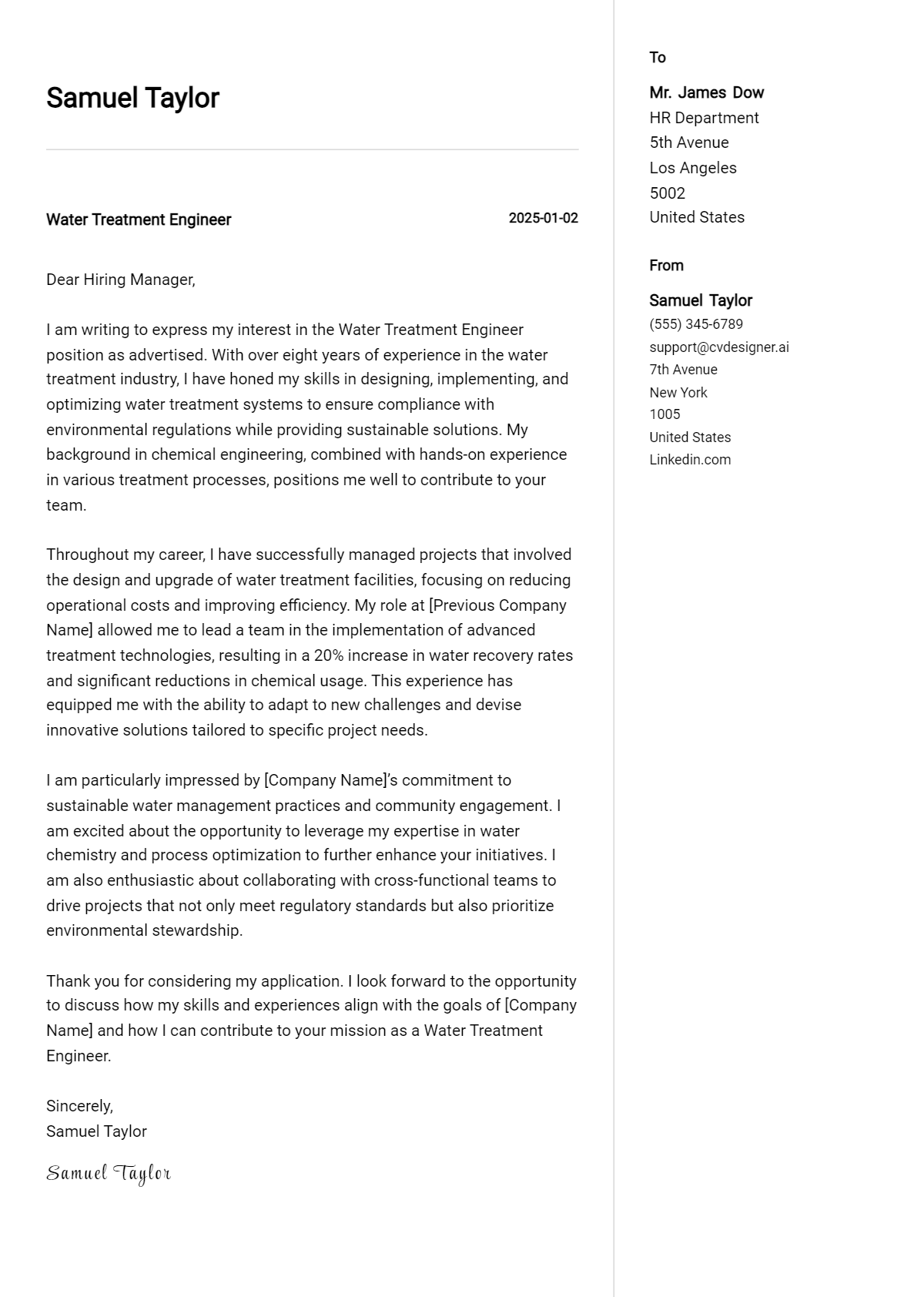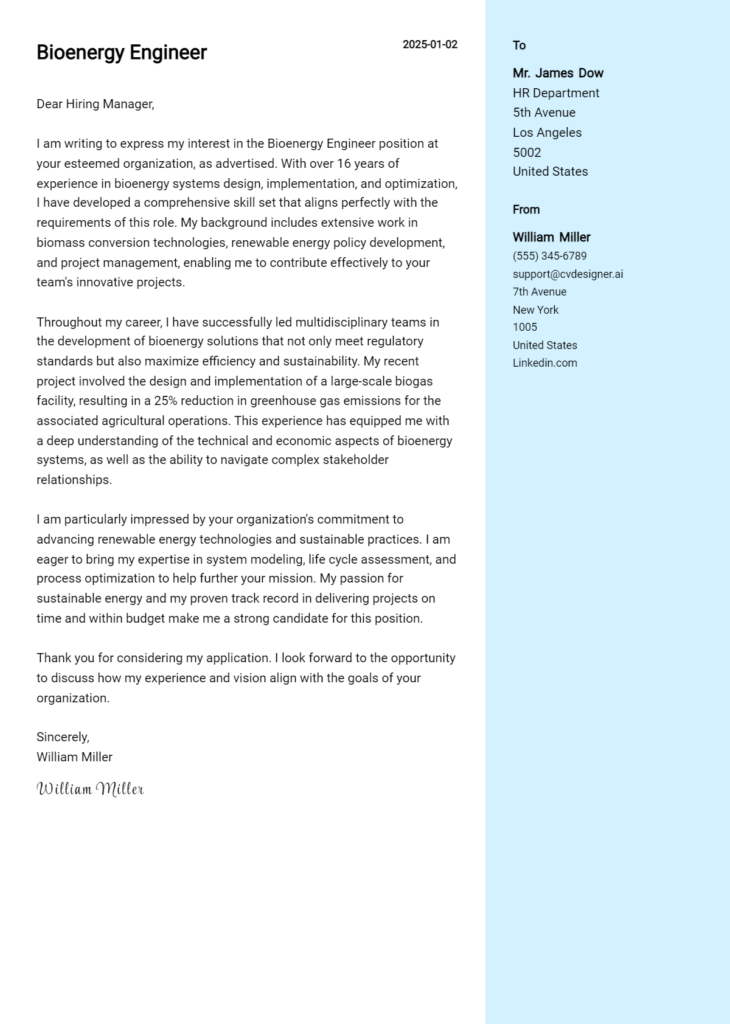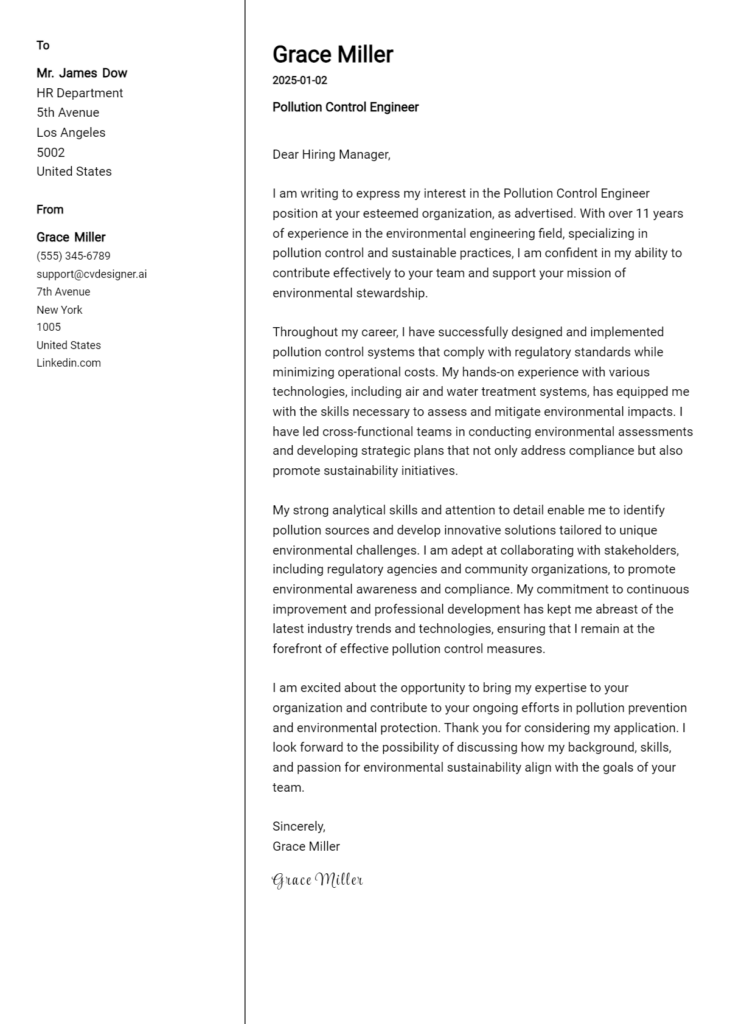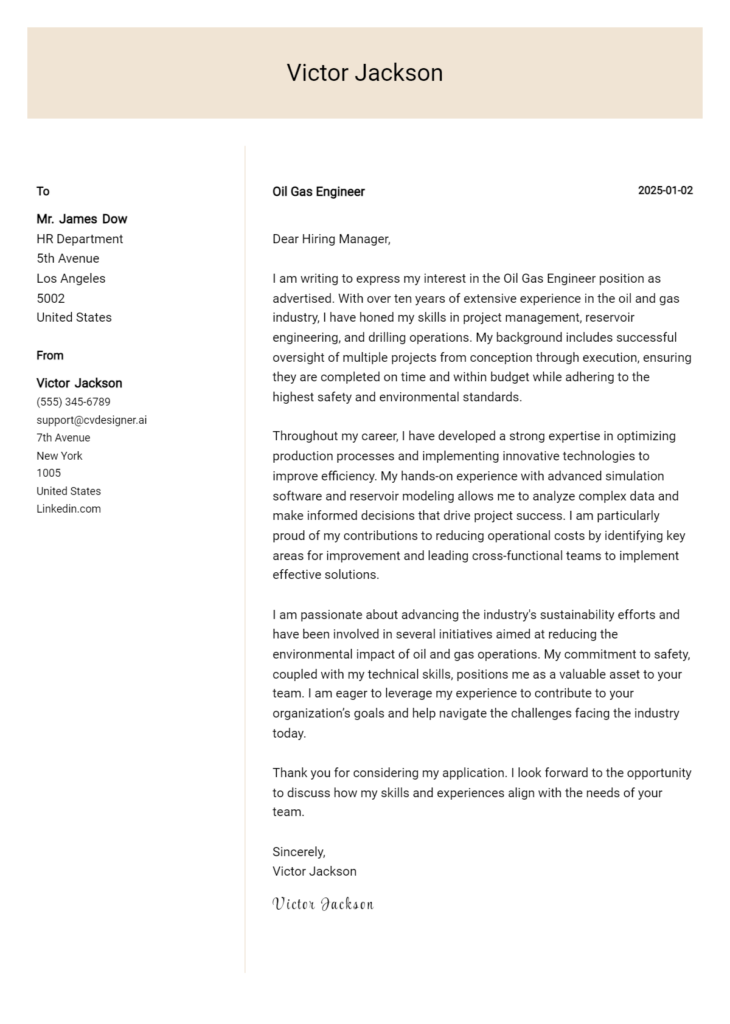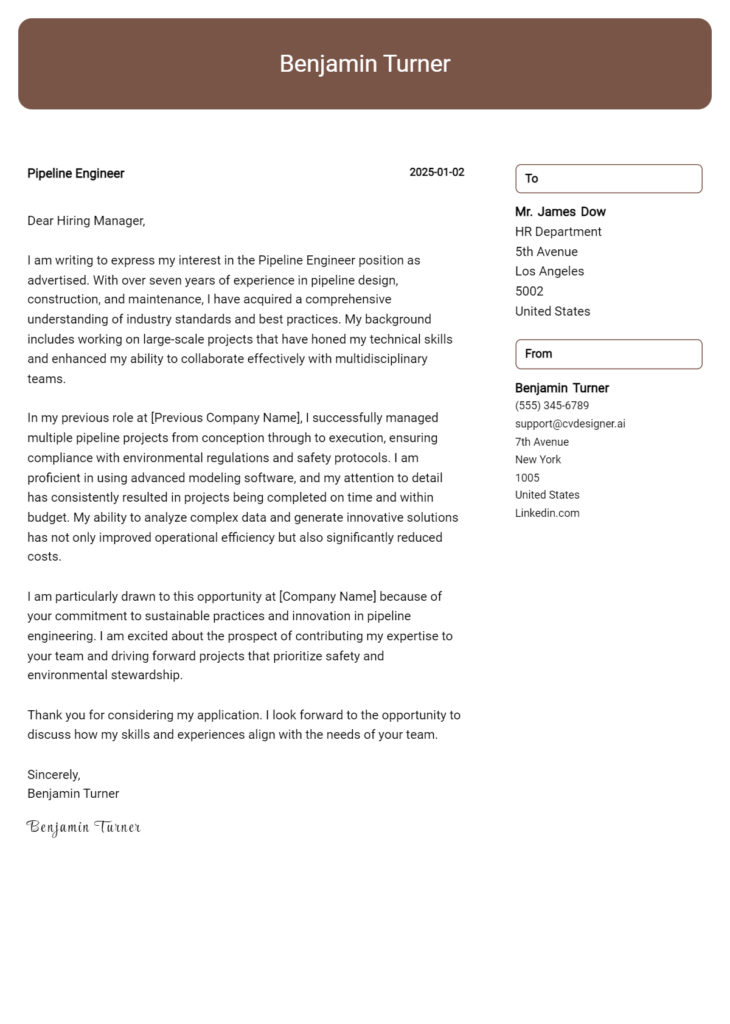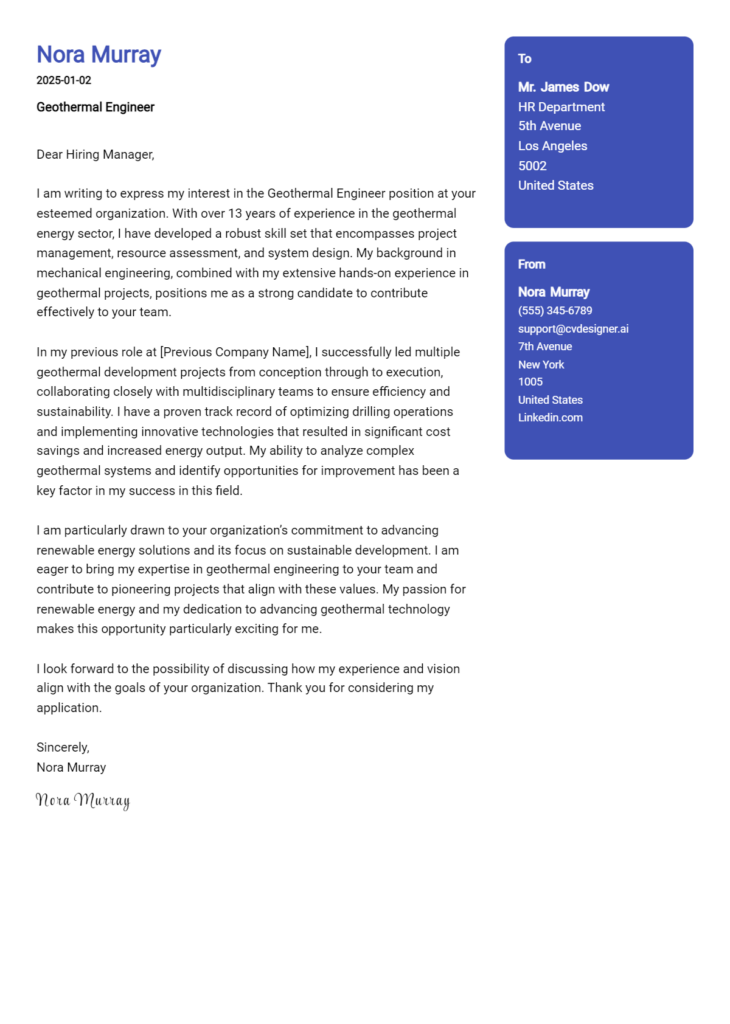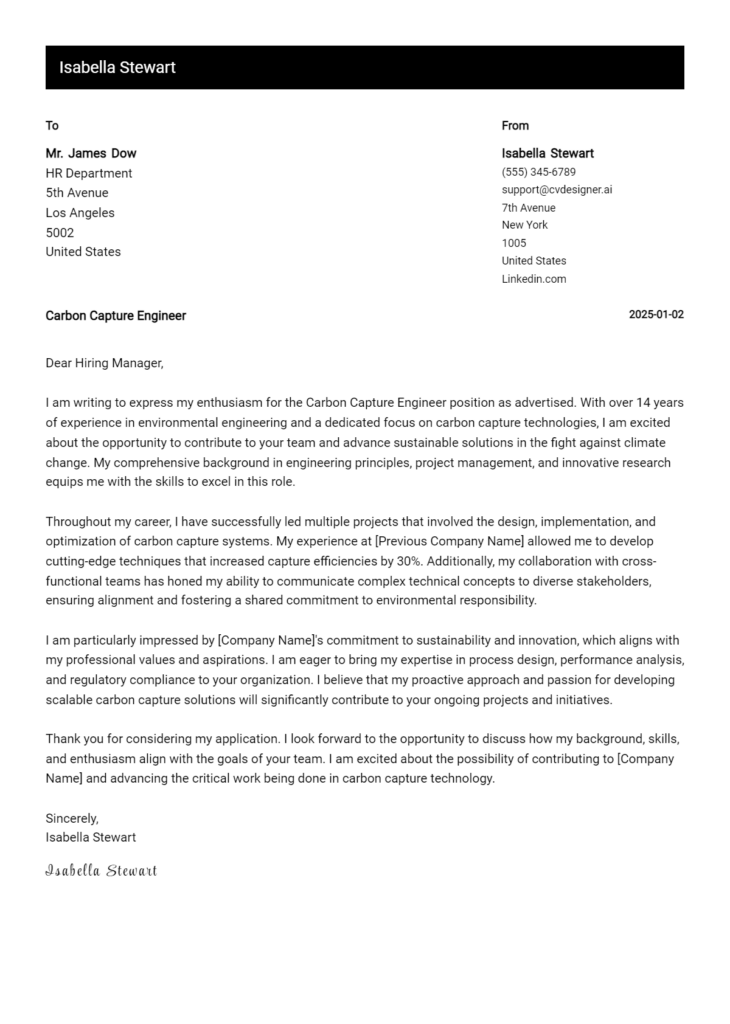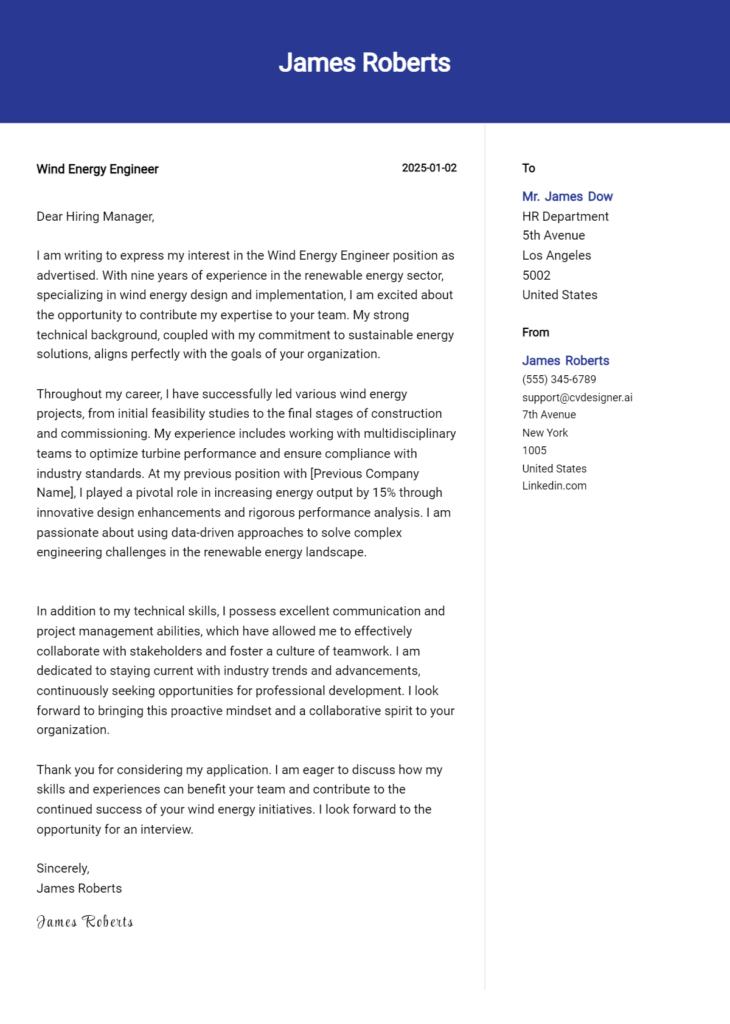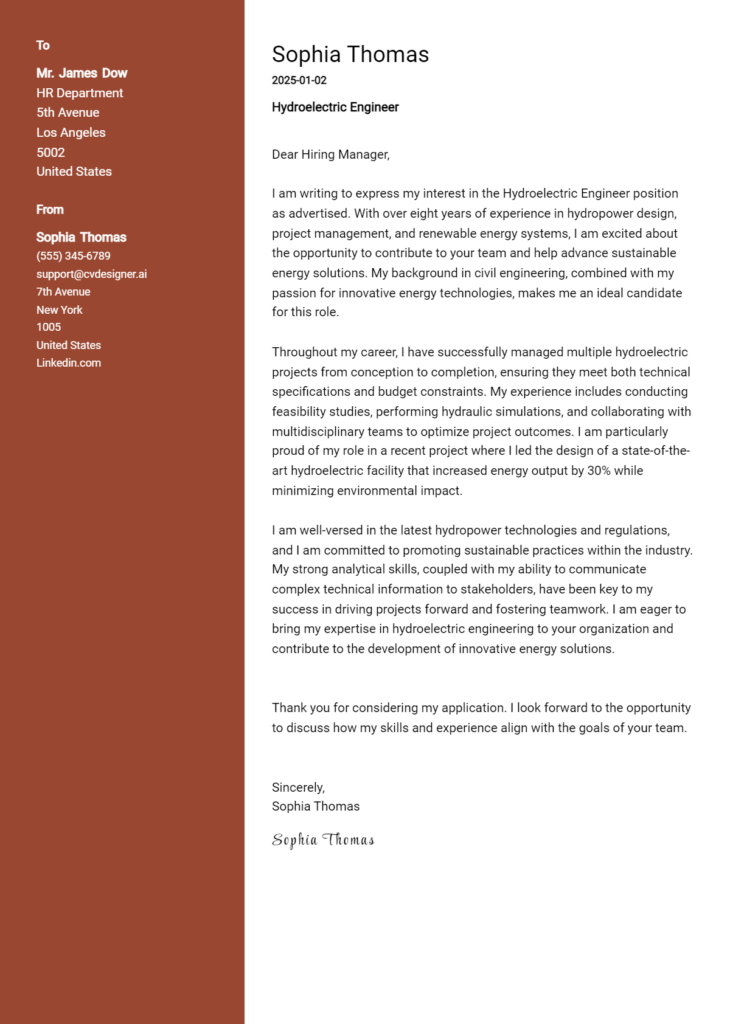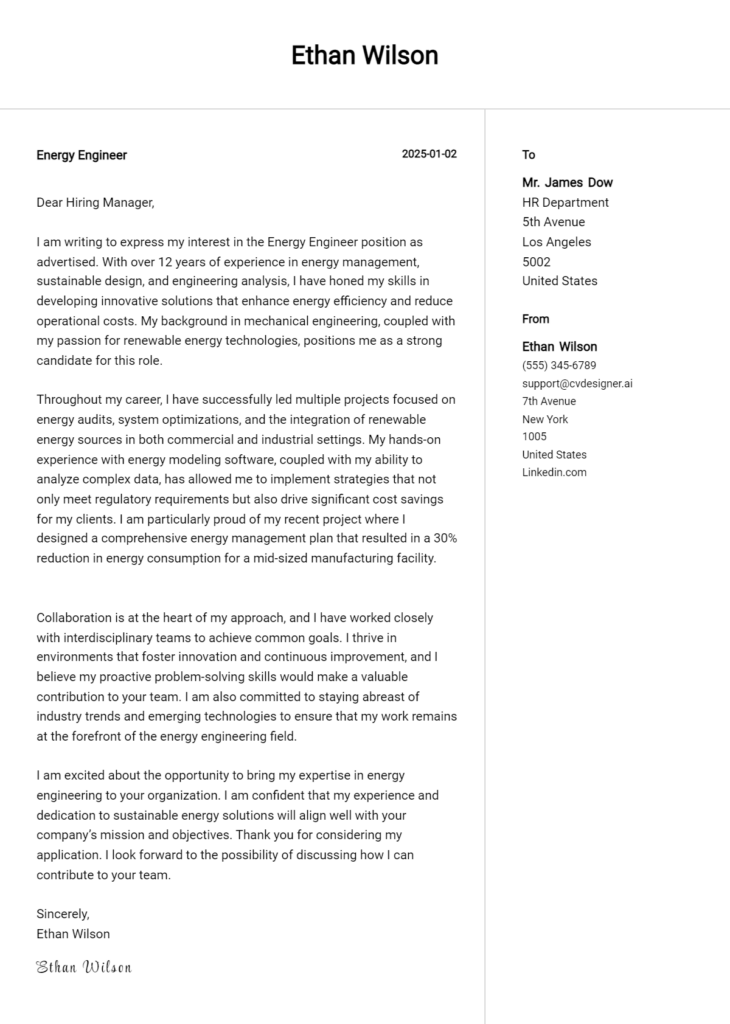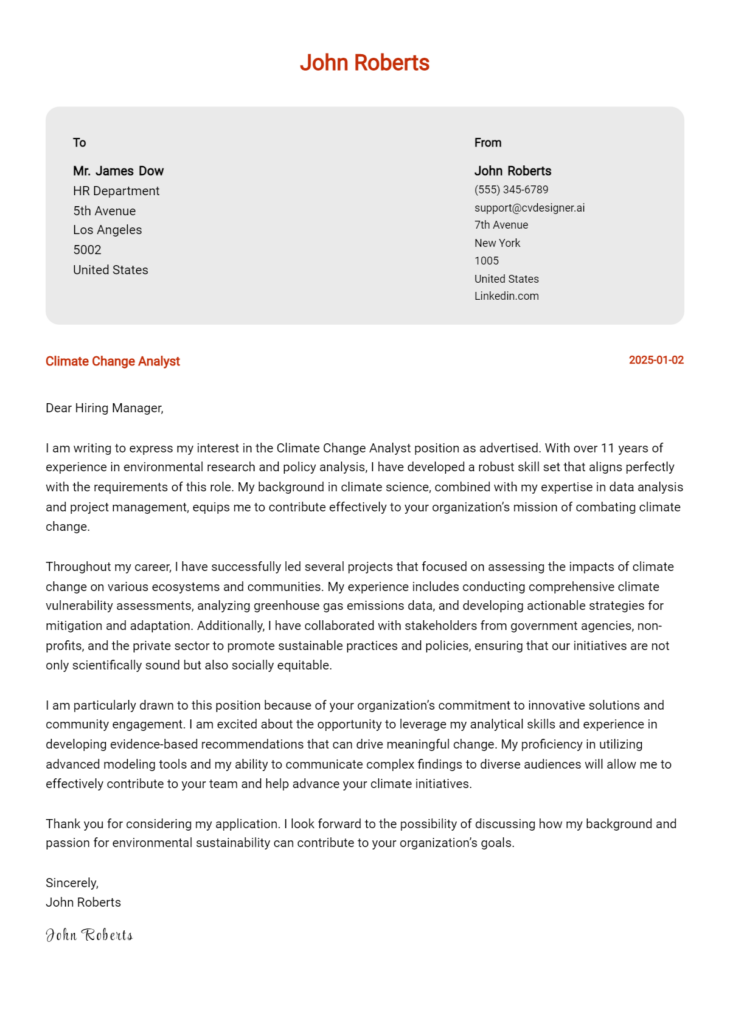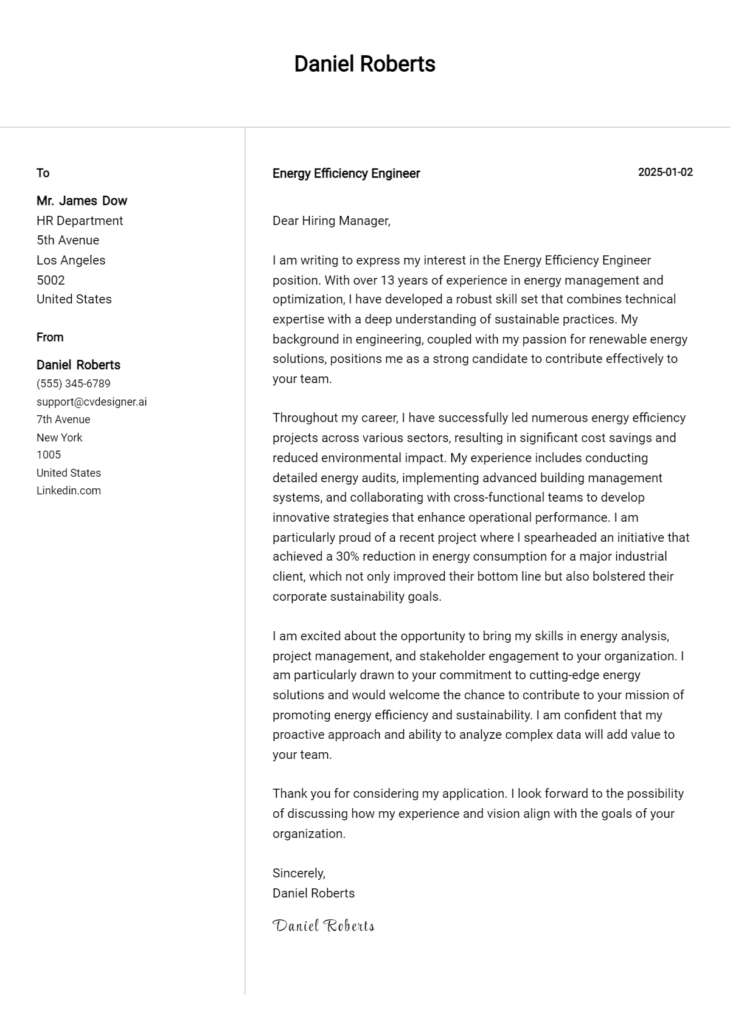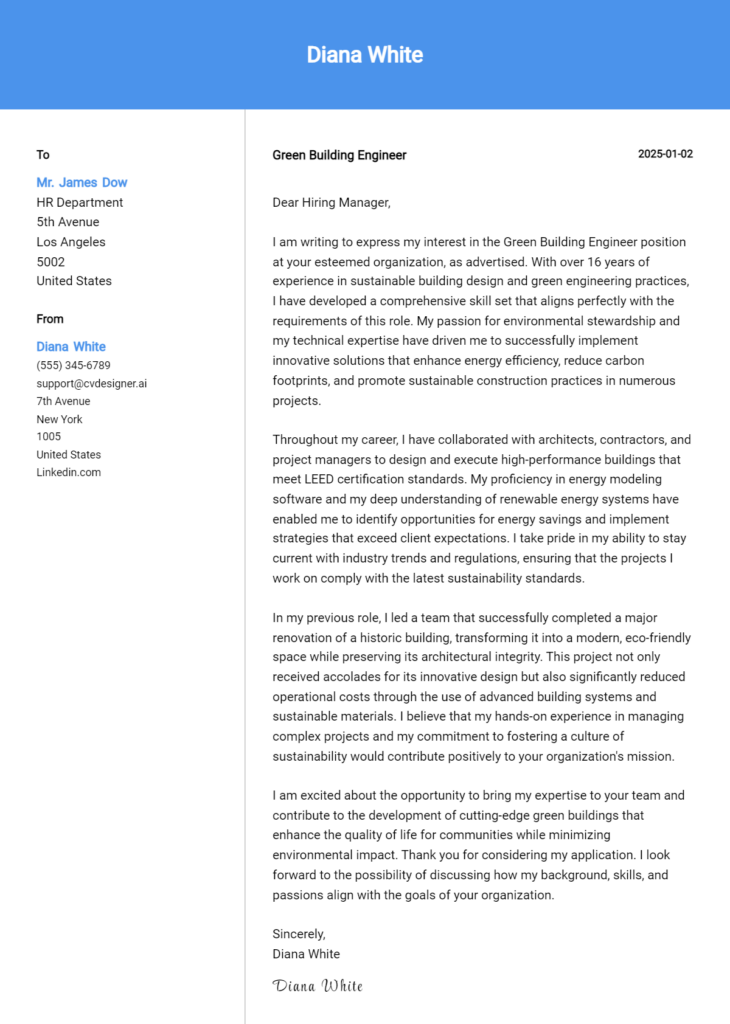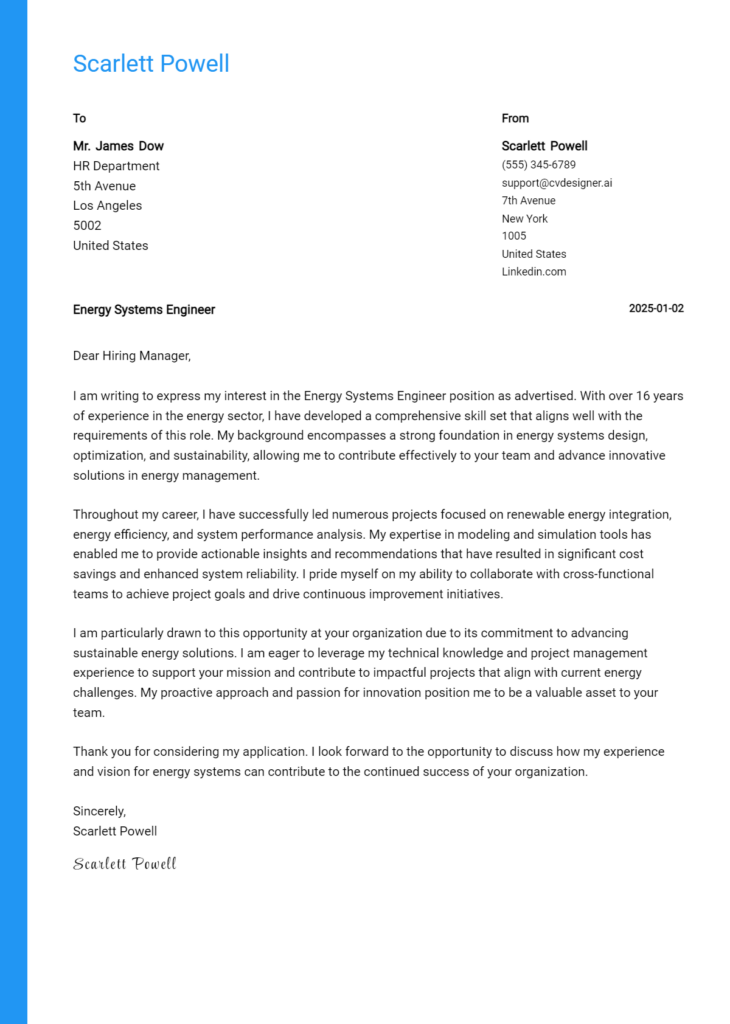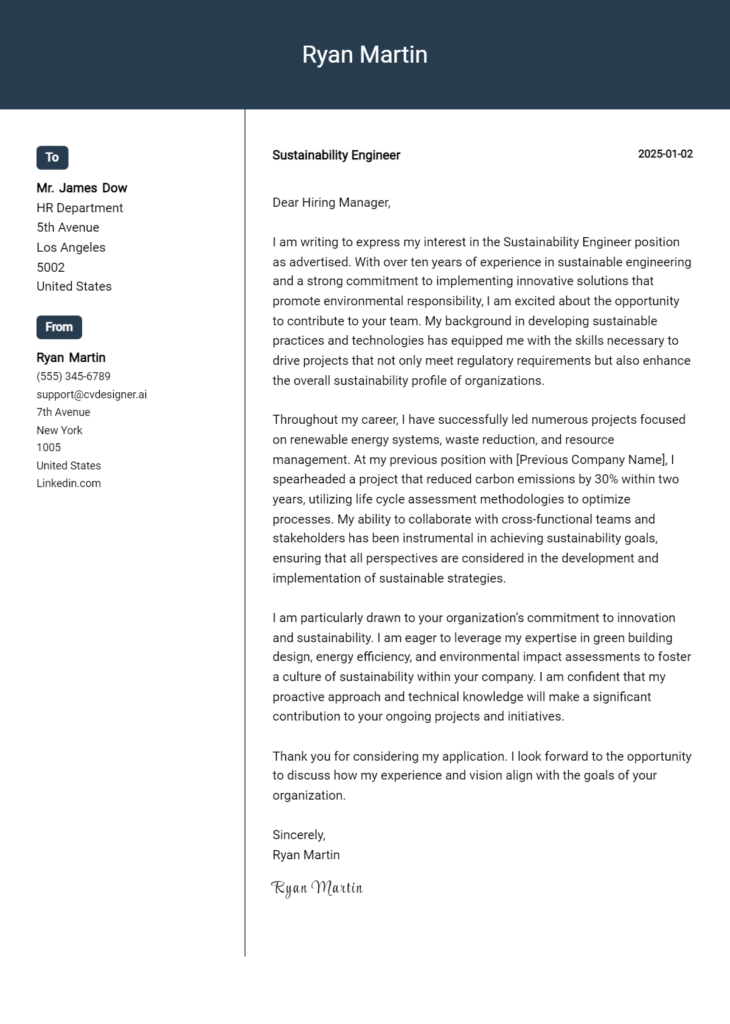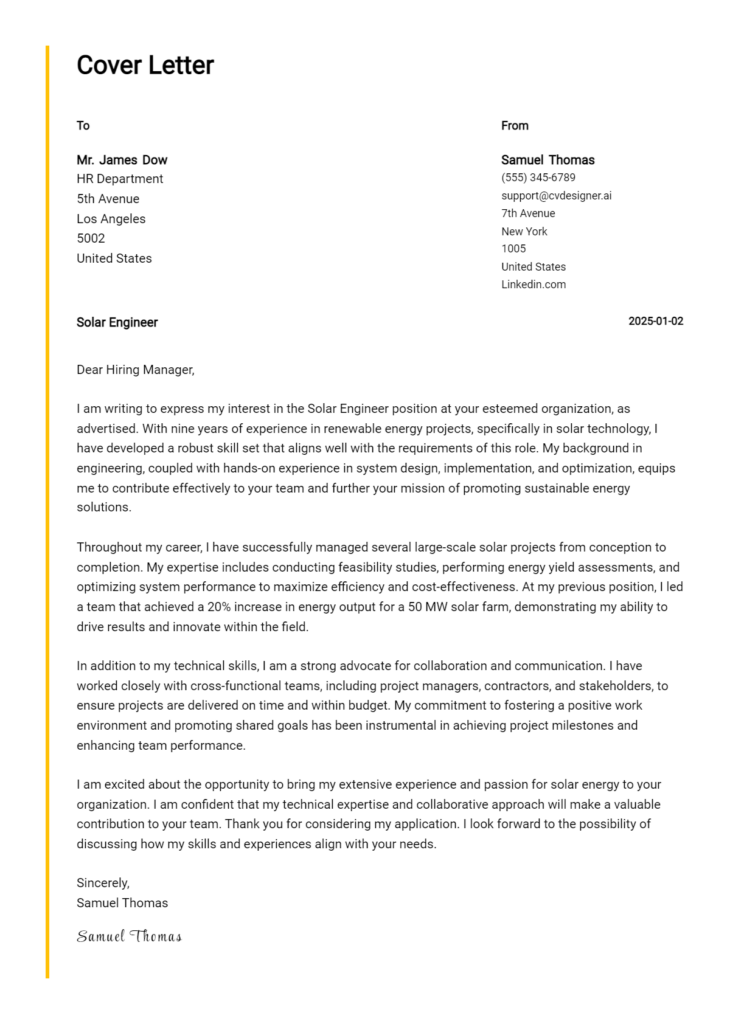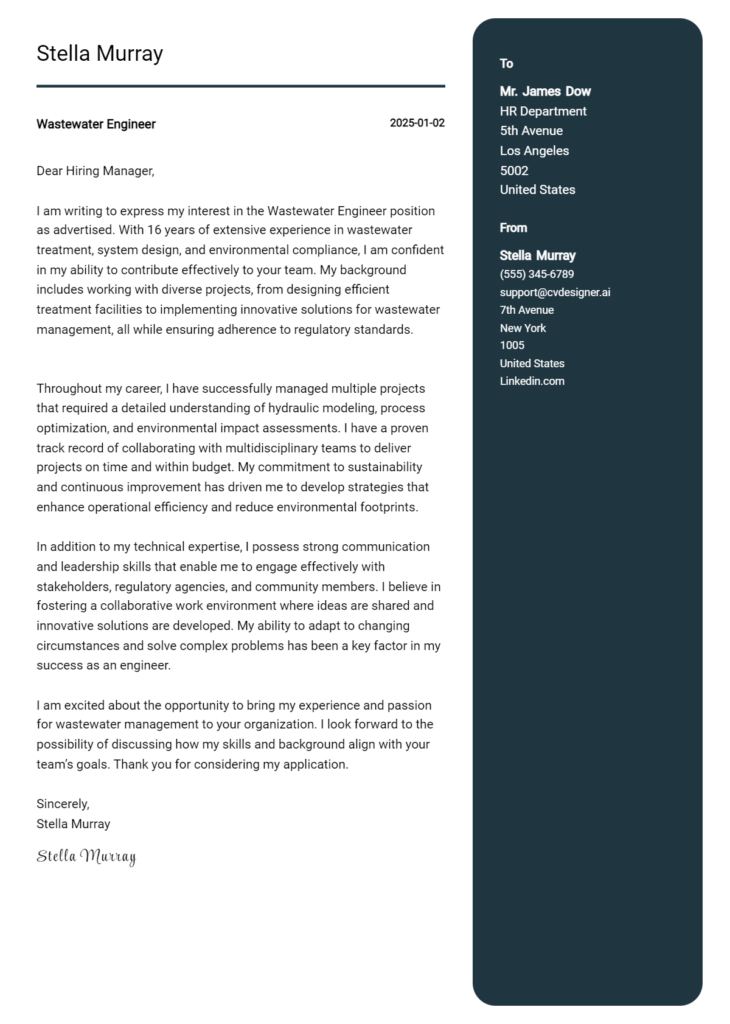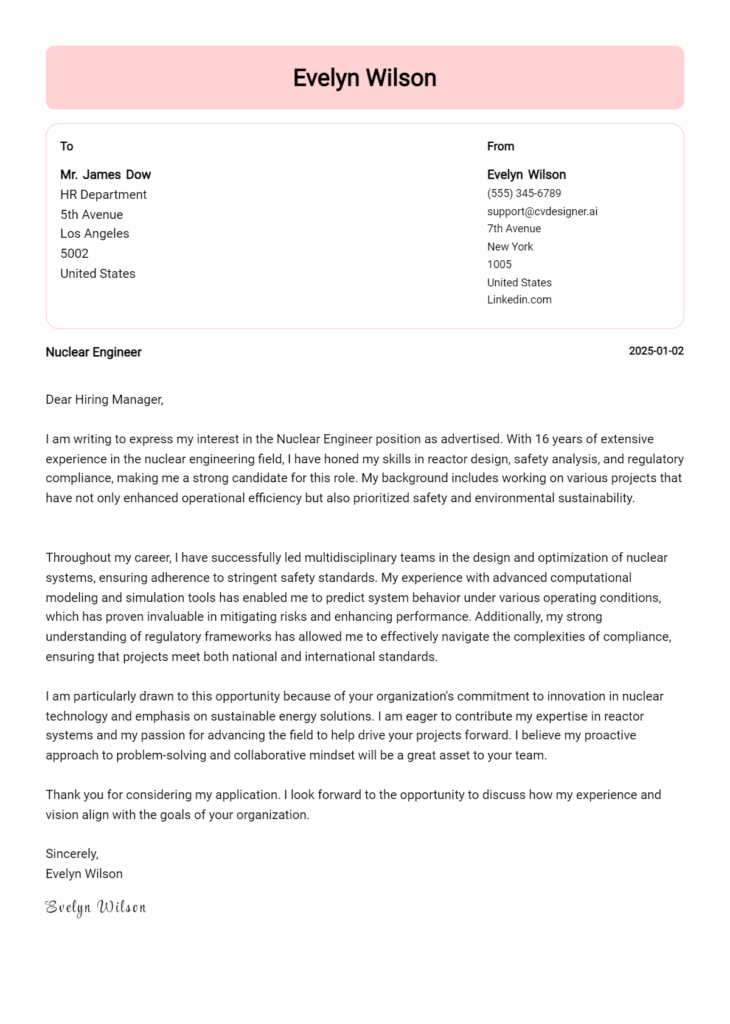Water Treatment Engineer Cover Letter Examples
Explore additional Water Treatment Engineer cover letter samples and guides and see what works for your level of experience or role.
How to Format a Water Treatment Engineer Cover Letter?
Crafting a compelling cover letter is essential for a Water Treatment Engineer, as it serves as your first impression to potential employers. A well-structured cover letter not only highlights your technical expertise and relevant experience but also demonstrates your ability to communicate effectively—an indispensable skill in the field of water treatment. Proper formatting ensures that your letter is easy to read and visually appealing, making it more likely to capture the hiring manager's attention.
In this guide, we will explore how to structure your cover letter, providing valuable insights and examples tailored to the water treatment engineering profession.
We'll focus on the essential components of a professional cover letter, including:
- Cover Letter Header
- Cover Letter Greeting
- Cover Letter Introduction
- Cover Letter Body
- Cover Letter Closing
Each section is crucial for emphasizing your qualifications and professionalism. Let’s break down each part and explain how to make your Water Treatment Engineer cover letter stand out.
Importance of a Cover Letter Header for a Water Treatment Engineer
The header of a cover letter is crucial as it sets the tone for the entire document and provides essential information for the recipient. A clear and professional header includes the applicant's contact information, the date, and the recipient's details, ensuring the letter is easily identifiable and organized. This is particularly important for a Water Treatment Engineer, where precision and attention to detail are vital. A well-structured header reflects professionalism and helps create a positive first impression, making it easier for hiring managers to reach out to qualified candidates.
Strong Example
John Doe 123 Waterway Lane Cityville, ST 12345 (123) 456-7890 johndoe@email.com October 10, 2023 Jane Smith HR Manager Clean Water Solutions 456 River Road Townsville, ST 67890
Weak Example
johndoe@email.com 10/10/23 HR Department Clean Water Solutions
The Importance of the Cover Letter Greeting
The greeting of your cover letter serves as the initial point of contact with the hiring manager and sets the tone for the entire correspondence. A well-crafted greeting demonstrates professionalism and shows that you are taking the application process seriously. By addressing the hiring manager directly, you personalize your communication and establish a connection, which can make a positive impression. To avoid generic greetings, such as "To Whom It May Concern," it is advisable to conduct some research to find the recipient's name, whether through the company’s website or LinkedIn. This small effort reflects your enthusiasm for the position and can set your application apart from others.
Strong Greeting Example
Dear Mr. Johnson,
Weak Greeting Example
To Whom It May Concern,
The Importance of a Compelling Cover Letter Introduction for a Water Treatment Engineer
A well-crafted cover letter introduction is crucial for a Water Treatment Engineer as it sets the tone for the entire application. It serves as the first impression to the hiring manager, making it essential to capture their attention immediately. An effective introduction should not only express genuine interest in the role but also succinctly highlight key skills or achievements that align with the job requirements. A powerful opening can differentiate a candidate from others, showcasing their enthusiasm and qualifications right from the start. Below are examples of strong and weak cover letter introductions for this specific role.
Strong Example
Dear [Hiring Manager's Name], As a dedicated Water Treatment Engineer with over five years of experience in designing and optimizing water treatment processes, I am excited to apply for the position at [Company Name]. My passion for sustainable water management and my proven track record in implementing innovative solutions have not only improved efficiency by 30% in my current role but have also contributed to significant cost savings. I am eager to bring my expertise in environmental engineering and my commitment to clean water initiatives to your esteemed team.
Weak Example
Hello, I am writing to apply for the Water Treatment Engineer position. I think I'm qualified for the job. I have some experience in water treatment, and I hope to get hired. Thank you for considering my application.
Purpose of the Cover Letter Body for a Water Treatment Engineer
The body of the cover letter for a Water Treatment Engineer serves as a crucial platform for the candidate to articulate their technical expertise, relevant experiences, and the unique value they bring to the potential employer. This section should effectively highlight specific projects and accomplishments that demonstrate the candidate's ability to design, implement, and manage water treatment processes. By detailing previous roles, successful outcomes, and the skills acquired through hands-on experiences, the candidate can create a compelling narrative that aligns with the company's mission and needs.
Strong Example
Dear [Hiring Manager's Name], I am excited to apply for the Water Treatment Engineer position at [Company Name]. In my previous role at [Previous Company], I led a project that successfully redesigned the water filtration system for a municipal facility, resulting in a 30% reduction in energy consumption and a 40% increase in water quality compliance. My hands-on experience with advanced treatment technologies such as reverse osmosis and UV disinfection systems has equipped me with the skills to innovate and improve existing processes. I am passionate about sustainable water management practices, and I believe my background in environmental engineering will allow me to contribute effectively to your team and help [Company Name] achieve its sustainability goals. Thank you for considering my application. I look forward to the opportunity to discuss how my expertise aligns with the needs of your organization. Sincerely, [Your Name]
Weak Example
Dear [Hiring Manager's Name], I am writing to apply for the Water Treatment Engineer position at [Company Name]. I have worked in water treatment for several years and have some experience with different systems. I think I would be a good fit for the job. While I have not led any major projects, I have participated in a few, and I understand the importance of clean water. I hope to bring my knowledge to your company. Thank you for your time. Best, [Your Name]
Importance of the Cover Letter Closing for a Water Treatment Engineer
The closing paragraph of a cover letter is crucial as it reinforces your qualifications and expresses your enthusiasm for the position. It serves as a final opportunity to summarize your skills relevant to the role of a Water Treatment Engineer and reiterate your interest in contributing to the organization's goals. A well-crafted closing encourages the employer to take the next steps, such as reviewing your resume or scheduling an interview, thus enhancing your chances of being considered for the position.
Strong Example
Thank you for considering my application for the Water Treatment Engineer position at [Company Name]. With a solid background in water quality management and a passion for sustainable practices, I am eager to contribute my expertise to your team. I am excited about the opportunity to discuss how my skills align with your goals and would welcome the chance to further explore my qualifications in an interview. I look forward to your response and hope to discuss my application in more detail soon.
Weak Example
Thanks for reading my letter. I think I would be a good fit for the job. I look forward to hearing back from you if you want to talk more about it or something.
These tips will assist candidates in crafting an effective cover letter for a Water Treatment Engineer position. A well-written cover letter not only highlights your technical skills and problem-solving abilities but also demonstrates your understanding of the Software Development Life Cycle (SDLC), your capacity for teamwork, and your commitment to continuous learning in the field. By showcasing these aspects, you can make a strong impression on potential employers.
Cover Letter Writing Tips for Water Treatment Engineer
Highlight Technical Skills
Clearly outline your technical expertise relevant to water treatment processes, system design, and equipment operation. Use specific examples from your experience to illustrate your proficiency with tools and technologies such as reverse osmosis, filtration systems, or chemical dosing. This not only showcases your qualifications but also demonstrates your hands-on experience in the field.Emphasize Problem-Solving Abilities
Water treatment often involves addressing complex challenges. Share a specific instance where you successfully resolved a significant issue, such as optimizing a treatment process or troubleshooting equipment failures. Detail the steps you took to find a solution and the positive outcomes that resulted, showcasing your analytical thinking and resourcefulness.Demonstrate Knowledge of the SDLC
Understanding the Software Development Life Cycle is increasingly important in modern water treatment systems. Include your experience with software used for monitoring and managing water treatment processes. Mention any projects where you participated in the development or implementation of such systems, illustrating your ability to integrate technology into traditional engineering practices.Showcase Teamwork and Collaboration
Water treatment projects often require collaboration with multidisciplinary teams. Highlight your experience working in teams, whether in previous jobs, internships, or academic projects. Discuss how you contributed to group objectives, facilitated communication, and resolved conflicts, demonstrating your ability to work effectively within a team environment.Express a Passion for Continuous Learning
The field of water treatment is continually evolving with new technologies and regulations. Convey your enthusiasm for professional development by mentioning relevant certifications, courses, or workshops you have pursued. This not only shows your commitment to staying updated in your field but also underscores your proactive approach to enhancing your skills and knowledge.
For additional resources, you might find cover letter templates helpful in structuring your letter, or consider using a cover letter builder to streamline the writing process.
Common Mistakes to Avoid in a Water Treatment Engineer Cover Letter
Crafting an effective cover letter is essential for standing out in the competitive field of water treatment engineering. Avoiding common pitfalls can significantly enhance your chances of making a positive impression on potential employers. Here are some common mistakes to watch out for:
Generic Content: Using a one-size-fits-all cover letter can be detrimental. Tailor your letter to the specific job and company to show genuine interest.
Neglecting Formatting: A poorly formatted cover letter can detract from your message. Ensure you follow a clear cover letter format that highlights your qualifications effectively.
Lack of Specificity: Vague statements can be unconvincing. Instead of saying "I have experience in water treatment," specify your roles and achievements in previous positions.
Overlooking Job Requirements: Failing to mention key qualifications or skills outlined in the job description can be a red flag. Align your experiences with the requirements to demonstrate how you are a suitable candidate.
Ignoring the Employer's Needs: Focus on how your skills can benefit the employer rather than just listing your qualifications. Highlight specific contributions you can make to their projects or goals.
Spelling and Grammar Errors: Simple mistakes can harm your credibility. Always proofread your cover letter or use tools to check for errors before submission.
Too Lengthy or Too Short: A cover letter that is either too long or too brief can lose the reader’s interest. Aim for a concise, engaging letter—ideally one page.
By avoiding these common mistakes and incorporating effective strategies, you can strengthen your cover letter and increase your chances of landing an interview. For inspiration, check out some cover letter examples to see how successful applicants present their qualifications.
Cover Letter FAQs for Water Treatment Engineer
What should I include in my cover letter for a Water Treatment Engineer position?
In your cover letter, highlight your technical qualifications and relevant experience in water treatment processes. Begin with a brief introduction that states the position you are applying for and where you found the job listing. Include specific projects or roles you've undertaken, emphasizing your familiarity with various treatment methods, regulatory compliance, and any relevant certifications. Mention soft skills, such as teamwork and communication, demonstrating your ability to collaborate with multidisciplinary teams. Finally, express your passion for water sustainability and the importance of clean water, tying it back to the mission of the organization you’re applying to.
How can I demonstrate my technical skills in my cover letter?
To demonstrate your technical skills, incorporate specific examples of your work experience related to water treatment systems. For instance, discuss your proficiency with water quality testing, treatment plant operations, or environmental regulations. Use quantifiable achievements, such as reducing contamination levels or optimizing treatment processes, to showcase your impact. You might also mention any software tools or technologies you are proficient in that are relevant to the role, such as SCADA systems or modeling software. This approach not only illustrates your expertise but also shows potential employers what you can bring to their team.
Should I tailor my cover letter for each job application?
Absolutely! Tailoring your cover letter for each job application is crucial in standing out to hiring managers. Research the company’s specific projects, goals, and values, and reflect these in your letter. For example, if the company has a focus on innovative water treatment technologies, mention your experience with those technologies and how it aligns with their objectives. Adjust your language and examples to match the job description closely, ensuring that you emphasize the skills and experiences that are most relevant. A customized cover letter demonstrates your genuine interest in the position and your commitment to contributing to the organization.
How do I conclude my cover letter effectively?
Conclude your cover letter with a strong closing statement that reiterates your enthusiasm for the position and the company. Express your eagerness to discuss how your skills and experiences can contribute to their projects and goals. Politely invite the hiring manager to contact you for an interview, and thank them for considering your application. It’s also a good idea to include your contact information in this section, making it easy for them to reach out. A well-crafted conclusion leaves a positive impression and reinforces your interest in the role, encouraging further engagement.
Build your Cover Letter in minutes
Use an AI-powered cover letter builder and have your letter done in 5 minutes. Just select your template and our software will guide you through the process.

